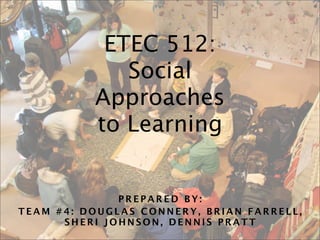
Social Approaches To Learning
- 1. ETEC 512: Social Approaches to Learning PREPARED BY: TEAM #4: DOUGLAS CONNERY, BRIAN FARRELL, SHERI JOHNSON, DENNIS PRATT
- 2. Welcome Welcome to our team’s presentation of Social Approaches to Learning. We hope the information, activities and discussion questions will help you further evaluate the different approaches presented. We look forward to reading your responses online!
- 3. Social Defined The interaction of living things with other living things, whether the interaction is voluntary or involuntary.
- 4. Social Approaches to Learning Learning happens in a specific context or social activity. Learning happens through the interaction of individuals, artifacts, tools and the environment. Three Main Perspectives •Situated Cognition •Distributed Cognition •Activity Theory
- 5. Perspective#1: Situated Cognition Much of what we learn is specific to the context or situation in which we learn it. We are social beings, knowledge is a matter of competence, knowing is a matter of participating, and meaning. Learning is a work in progress.
- 6. Situated Cognition ~ Culture Learning begins in the culture we are in. The process of enculturation. We pick up jargon Imitate behaviour Act in accordance to cultural norms Knowledge accumulates through the generations of a society
- 7. Situated Cognition ~ Tools Knowledge is thought of as a tool. We develop a better understanding of a concept when we use the tool as opposed to just acquiring it. For example, we learn how to use a hammer by building a shed not by just purchasing the hammer at Home Depot. How we use our “hammer” is a reflection of our culture.
- 8. Challenges Authentic vs. School Activity This theory suggests that we learn better through authentic activities yet most of what we do in school is inauthentic. For example, we teach a student how to do a math formula, not necessarily how to apply it to real, authentic situations that would make it more meaningful.
- 9. Communities of Practice Falls under Situated Cognition A voluntary group who have a common interest in a body of knowledge who are motivated by the need and want to share problems, experiences etc.
- 10. Perspective #2: Distributed Cognition Cognition is better understood as a distributed phenomenon that at an individual level. Cognitive processes are not limited to the minds of individual people, instead, they involve many people, tools and artifacts. Cognition is an event situated in a complex sociocultural world.
- 11. Distributed Cognition ~ Collective Problem Solving ~ The cognitive properties of a group are different than that of the individuals within. Knowledge can be variable and redundant. Members take on multiple roles. Must work with ineffective strategies and misconceptions. Together, provide collaborative work skills. (pool resources) Intersubjectivity- common sense between people.
- 12. Distributed Cognition - Challenges Paradox of the commons. Individual rationality and group rationality diverge.
- 13. Perspective #3: Activity Theory Activity is a collection of roles and responsibilities taken on by different people. Each role and responsibility is only meaningful in the broader context. Individual and social levels are interlinked. Artifacts carry a particular culture and history.
- 14. Activity Theory Basic Unit = Activity Three Levels of Activity 1. Activity towards a motive (why) 2. Action towards a goal (what) 3. Operation based on specific conditions (how) Activities: satisfy a need Actions: embody the activities
- 15. Activity Theory ~ Main Principles Object Orientedness People live in a reality that is objective Internalization/Externalization Distinction between internal and external activities, Internalization: External activities become internal activities. Mediation Activity is influenced by the tools used. Principle of Development Research combines active participation and monitoring developmental changes. Utility of Consciousness & Activity Mind emerges & exists as a component of human interaction with the environment. Hierarchical structure of activity Activity, action, operation, motive, goal, conditions
- 16. Activity Theory ~ Hierarchical Structure ~ Figure 1. Model of Activity Theory shows the relationship between the subject or individual, the object and the community, as well as how rules, tools, and the division of labour are used in the transformation of the object into the desired outcome. (diagram from Kuutti, 1995).
- 17. Activity Theory ~ Challenges Focus on tools and individual operations may detract from big picture ideas Assumes we are all rational actors Too much structure can impact impulse and creativity Focus on the system versus the individual
- 18. Comparisons Situated Cognition, Distributed Cognition, and Activity Theory all place emphasis on the group Situated Cognition emphasizes a sense of place Distributed Cognition emphasizes global effects Activity Theory focuses on specific tasks
- 19. Resources Brown, Collins, & Duguid (1989). Situated Cognition and the culture of learning. Educational Researcher, 18, 32-42. Retrieved July 25, 2006 from: http://links.jstor.org/sici?sici=0013-189X %28198901%2F02%2918%3A1%3C32%3ASCATCO%3E2.0.CO%3B2-2 Driscoll. M.P. (2005). Psychology of Learning for Instruction (pp. 153-182; Ch. 5 – Situated Cognition). Toronto, ON: Pearson. Farrell, B. (Photographer). (2006-2009). Photostream [online images]. Retrieved November 1 from: http://www.flickr.com/brianfarrell Kuutti, K. (1995). Activity Theory as a potential framework for human-computer interaction research. in B. Nardi (Ed.), Context and Consciousness: Activity Theory and Human Computer Interaction (pp. 17-44). MIT Press. Nardi, B. A. (1995) Studying Context: A comparison of activity theory, situated action models, and distrubuted cognition. In B. A. Nardi (Ed.) Context and Consciousness: Activity Theory and Human-Computer Interaction (pp. 35-52). Cambridge, MA: MIT Press. Available online at: http://www.ics.uci.edu/~corps/phaseii/nardi-ch4.pd. Rogers, Y. (1997). A Brief Introduction to Distributed Cognition. Available online at: http:// www.slis.indiana.edu/faculty/yrogers/papers/dcog/dcog-brief-intro.pdf Spasser, M. A. (1999). Informing information science: The case for activity theory. Journal of the American Society for Information Science, 50, 1136-1138. http://dx.doi.org/10.1002/(SICI)1097-4571(1999)50:12<1136::AID-ASI17>3.0.CO;2-0
- 20. THANK YOU FOR VIEWING: ETEC 512: Social Approaches to Learning PREPARED BY: TEAM #4: DOUGLAS CONNERY, BRIAN FARRELL, SHERI JOHNSON, DENNIS PRATT